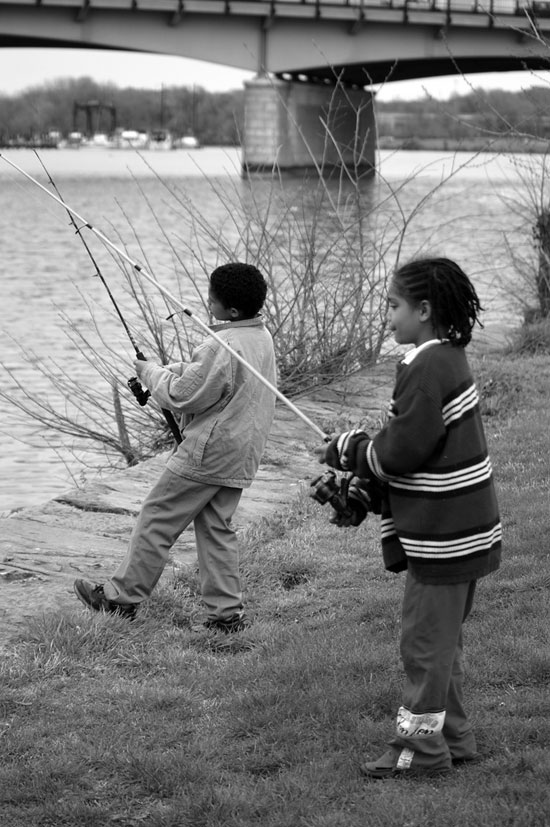New study shows Anacostia fishermen are sharing, consuming contaminated fish
Established outreach seems no match for anglers’ perceptions or community needs.
A yearlong survey of anglers along the Anacostia River has confirmed that many fishermen are catching, sharing and consuming contaminated fish.
While fishing advisories in Maryland and Washington, D.C., have been in place for more than two decades, these warnings are often not seen, understood or listened to—and as many as 17,000 residents could be consuming fish caught in the Anacostia.

Image courtesy Len Matthews/Flickr
Located less than one mile from the nation’s capital, the Anacostia River has long suffered environmental degradation. Polluted runoff from urban streets and hazardous waste sites has caused toxic chemicals to build up in the water and in the bodies of fish, which could cause disease or development disorders in those who consume them.
According to the results of a survey that studied the social behavior of Anacostia anglers, a complex set of factors is driving the sharing and consuming of locally caught and potentially contaminated fish: past experience and present beliefs, a lack of awareness of the health risks involved and an overriding desire to share their catch with those who might otherwise go hungry.

Image courtesy LilySusie/Flickr
Research conducted through hundreds of interviews along fishing “hotspots” and a community survey that canvassed the lower Anacostia watershed found that 40 percent of fishermen had never heard that fish from the Anacostia could make them sick. Some anglers thought visual cues—like obvious lesions, cloudiness in the eyes or the color of a fish’s blood—would help them determine the health of a fish, or that related illnesses would soon be apparent rather than chronic or long-term. If a fisherman had not fallen ill from a meal of fish before, then he might perceive the fish to be healthy or think that his preparation methods made it clean.
Research also found that current advisories do not resonate among diverse anglers. Just 11 percent of fishermen had seen a sign or poster, and even fewer had received warning material with a fishing license or reviewed related information online. And English-only outreach is not effective among a population in which one-quarter speaks a language other than English at home.

Image courtesy 35millipead/Flickr
But how can Anacostia anglers be reached?
"The answer to this problem will be far more complex than simply telling anglers not to share their catch,” said Steve Raabe, principal of the Maryland-based research firm that conducted the survey.
The Anacostia Watershed Society, among the partners behind the survey, agrees. While the non-profit’s director of public policy acknowledged this study is not a “silver bullet solution,” he hopes it will bring about positive change.
“We are hoping [the study] will be the catalyst to engage all stakeholders—federal and local governments, food security and hunger organizations, environmental and health organizations, as well as residents—to come up with answers,” Brent Bolin said.
“Through this research effort, we have already begun identifying potential solutions,” Bolin continued, from directing better messaging to affected populations to expanding urban gardens, farmers markets and other programs that will address the long-term challenges of clean water, food security and human health.

Comments
Thanks so much for the suggestion! According to the report, contaminants like polychlorinated biphenyls (PCBs), dichlorodiphenyltrichloroethane (DDT), lead and mercury linger in the Anacostia River's waters, sediment and many species of fish. Health problems associated with increased exposure to these chemicals include cancer, liver disease and developmental effects, as well as effects on the immune and endocrine systems. Children, elderly people and women of childbearing age are at most risk.
You can learn more by reading the full report: http://www.anacostiaws.org/userfiles/file/AWS_angling_FINAL_web.pdf
In an article of this nature, it would be appropriate to include what the most serious and common contaminants are. The reader can then both be educated as to what the nature of the concerns are, as well as judge for themselves how serious they are.
Thank you!
Your comment has been received. Before it can be published, the comment will be reviewed by our team to ensure it adheres with our rules of engagement.
Back to recent stories